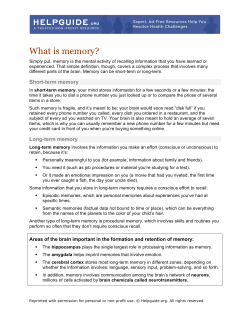
Time Management Asnath Mayayise & Michelle Schreuder
Time Management Asnath Mayayise & Michelle Schreuder Directorate for Counselling, Career & Academic Development Es’kia Mphahlele Registration Hall, 1st Floor Unisa Sunnyside Campus 012 441 5373/2 http://www.unisa.ac.za/ counselling@unisa.ac.za Focus of this session Time Management The 60/30/10 principle of time management and study The advantages of group work What is Time Management? What is Time Management? Time management is a set of principles, practices, skills, tools, and systems that work together to help you get more value out of your time Why is it important? It is one of the top reasons why students drop out of university They don’t know how to manage their time effectively – social life, studies, family life etc. Improve quality of life Reduce frustration, irritability, anger Reduce negative stress Gain a sense of accomplishment Have more time to do things you want to do Improve organization in your life Peace of Mind The FACTS: • Research shows that: • “Procrastinators produce inferior work, contrary to beliefs that the best work is done under pressure.” • A study by Tuckman (2002), found that students who complete their work late or at the last minute are prone to say to themselves things like, (Tice and Baumeister, 1997) "I'm just waiting for the best time to do it" "I know I can pull it out at the last minute" Students who indicated that they frequently tell themselves such things did relatively poorly. The EFT Principle of Time Management E F T Exploration Fixation Testing 60% 30% 10% An effective method of managing your time with regard to any activity (assignments, exams, work, etc.) Short-term planning: Exploration Phase • Explore & gain information & knowledge about a topic Explore 60% Fix 30% Test 10% • Includes activities that familiarise yourself with the material you have to study • Primary objective: be prepared for the intensive study that follows Short-term planning: Exploration Phase During the Exploration phase: Work through your curriculum Complete your assignments Do additional reading in the library Discuss your field of study with others in the field Contact fellow students to sort out problems Make summaries for intensive study later Identify questions you have to answer Identify & clarify difficult concepts Assignment Writing: 60% 30% 10% Research Write Review Short-term planning: Fixation Phase Intensive study phase Bringing together logically all the facts gathered during exploration phase Explore 60% Fix 30 % Test 10 % Divided into 3 steps: 1. Consolidation Phase 2. Summary Phase 3. Memorisation Phase Short-term planning: Fixation Phase Consolidation Phase Summary Phase Thorough preview of study matter & additional notes Identify main topics & ideas of study material Making sure you understand all concepts & words Make adequate summaries of the work to be studied Helps you separate more important facts from less important ones Memorisation Phase Using a core summary to reduce material to essential key words to use as reference points during the exam Committing the work to memory through understanding of the key concepts Short-term planning: Fixation Phase Example: Exam Preparation Explore 60% 60% Fix 30% Test 10% 30% 10% Consolidation Phase: Summary Phase: Memorisation First repetition of all work Summaries & Phase: main points main points Short-term planning: Testing Phase Test yourself by asking & answering questions which cover the study material Use the study material to formulate questions Use old exam questions to practice Have group study sessions Explore 60% Fix 30 % Test 10 % The more questions you answer, the more familiarised you will become with the work How do the different planning cycles fit together? Long-term over a semester 4 February Explore 60% 31 March 28 April Fix 30% • Read • Refine summaries • Do assignments • Study - memorize • Group discussions • Summaries 7 May Test 10% • Answer exam questions • Have group sessions • Check old papers Time Management Process Work back from last date – e.g. 3 June Count number of days from today (e.g. today is 1 March) to 3 June = 95 days Divide number of days into three parts according to the 60/30/10 principle 60% = 57 days : 1 March to 26 April 30% = 29 days : 27 April to 25 May 10% = 9 days : 26 May to 3 June Exploration Fixation Testing Group Discussions: Study Groups Advantages of a study group: Interact with other students Help each other with problems Group support Opens discussion of different topics – different views & opinions Study Groups: Key Principles Choose members that you get along with 3-4 participants Select group leader Agree on meeting place & time Make personal commitment Don’t use group to replace independent study Study Groups: Procedures Try to reach agreement on important and less important work Clear up any differences between notes of the different group members Use surface and deep learning techniques Identify possible exam questions Meet regularly Ask each other questions about past study methods “How do you usually study for subject X ?” “Based on your experience, what is the best way to study for subject X?” Forming a Study Group To form a study group: Phone Unisa Contact Centre at 0861670411 Request a list of fellow students for modules that you are registered for You can also access a class list on myUnisa
© Copyright 2025





















